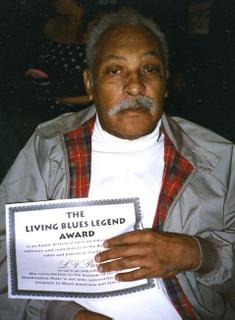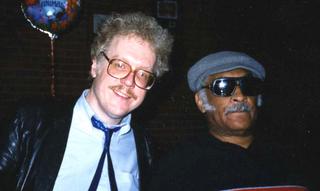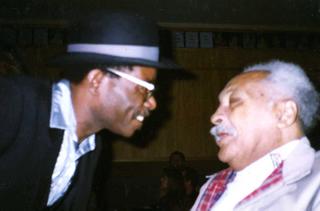 L.V. Parr Interview
L.V. Parr InterviewInterviewed by Mark Dalton and Mike Lynch in Seattle, Spring of 1996. The transcription was created and edited by Mark Dalton. This piece originally appeared on the (long gone) Caldonia web page, and was republished in the May 1997 edition of Blues and Rhythm ("The Gospel Truth") Magazine (UK). L.V. Parr died in Seattle in 1996.
We caught up with Elven "L.V." Parr (left, at a Washington Blues Society meeting around 1994) at a First Hill retirement home, in a room he shares with another resident. The room is impersonal, institutional, much like a hospital room, except for the Washington Blues Society Award on the wall above L.V.'s bed. L.V. is blind now, from the effects of diabetes, and he has slowed down some from the accumulation of 70 years of living, but he was up for talking with us, laughed readily, and occasionally we could see the years drop away as he touched on a happy memory of a free and easy moment, living the blues. Here's L.V.'s story:
I was born in Osceola Arkansas in 1925. My dad ran a cotton gin for many years there. My mother was a housewife, and I was their only child. My dad played piano, and I was exposed to all kinds of music growing up. I didn’t listen to that much blues when I was a child. I sang in the church choir, and was in a gospel quartet as a teenager.
I got into some trouble with the law as a young man, and I really picked up on the guitar while I was in prison. I didn’t have much to do but practice, and I had music books and teachers there too. I had a few guys I could play guitar with, who would show me different things playing, and I began to like it when I was playing with them. Guys would teach me this and that and I was very into listening.
I started playing professionally in 1950. We had a band in Osceola called the "In the Groove Boys" and we were on the radio every day at 3pm. I think the station was KOSE. We had guitar, piano, and drums. We did our own show and also backed up special guests.
I used to know Albert King back in Osceola. He was Albert Nelson back then, that's before he got famous. We used to play together a little bit, but he couldn't play nothing but, you know, soul or blues. He didn't know any chords at that time, but he made it big. I wish I was in his shoes!
I started going to Memphis regularly after I'd been playing awhile. (Editor's note: Osceola, Arkansas is a town right on the Mississippi River, close to Memphis.) I had a hotel gig there, and would go out on the road with various bands and singers that needed a guitar player. The hotel was owned by a guy named Sunbeam Mitchell, who was also a music promoter.
Sunbeam Mitchell started off promoting B.B. King in the early days. During this period I played with Bobby Bland, Jr. Parker, Johnny Ace and Percy Mayfield, among others. I played a gig with Ray Charles at hotel in Atlanta. There were so many guys I played with... I was working all the time back then.
I also did quite a bit of recording at that time. I was...what do you call it, a studio musician? I did a lot of work at Sun Studios, where Elvis Presley made his first recordings. (Editor’s note: While Sam Phillips is best known for discovering and nurturing young rockabilly artists like Presley, Jerry Lee Lewis, Carl Perkins and others, he made an incredible number of great blues recordings as well.) I recorded there with Johnny Ace, Bobby Bland and Earl Forrest, among others. B.B. King was a friend of mine back in those days. We never played together because he had a pretty good guitar player in his band already! (laughs). We used to hang out. He was also a disc jockey at that time. I played quite a bit on Beale Street in Memphis. I played with all the local guys, and then Sunbeam would send us out on the road. I did a long tour with Johnny Ace, not too long before he died. We were out for about six months, mostly playing theaters. We were being booked out of New York City. I played the Apollo Theater back then, and all over the country.
They claimed Johnny Ace killed himself playing Russian Roulette. I think that was a lie. I knew Johnny too well. He wouldn’t do himself that way. What happened was Johnny was fooling with a girl, a white girl. I had just left the tour in Kentucky. This girl had been following Johnny around the south for awhile. Every show he did, she was there. The guys in the band told me that the night Johnny died, this girl's brother and her uncle came to see Johnny, that they went up to his room, and brought down this story that he was playing Russian Roulette. I think one of them shot Johnny. (Editor's note: The controversy over the death of Johnny Ace has been going on ever since the event. L.V.'s version here is one of several explanations we've heard.)
Johnny Ace was a fun guy to be with. He kept everyone laughing. He could just let himself go. I played on some of his records, including "The Clock." That one was really my tune - I pretty much wrote that one. I worked with him off and on for a couple of years all together, after he went out on his own. Before that he played piano in B.B. King's band.
Another guy I played with down south was Earl Forrest, a good rhythm and blues singer. He was just starting out. We played all down through the south, down into Mississippi. He had a hit record out called "Whoopin' and Hollerin'." I'd be talking to pretty girls and Earl, he'd come up and say "I'm the bossman here!" (laughs). The girls, they'd say "Who?"
I met Fenton Robinson in Cairo, Illinois around that time. He was about eighteen years old then. I left the little group I was in to go on this tour, and Fenton came in to take my place. I used to show him different stuff, techniques when he was getting started. He played in my place until I got back off the road. (Editor's note: Tom McFarland confirmed this story with Fenton Robinson, who spoke highly of L.V. as a mentor.)
I came out to Seattle in 1959. I got into trouble with the law again, and was basically paroled to my dad, who was living out here by then. I played all over the Northwest when I got here. Things were jumping. I played at first with a guy named Gerald Frank, who had a band and also owned a lot of property, after-hours joints and stuff, around town. He played with Duke Ellington at one time, and could play drums and organ. We played at the Black and Tan, Birdland, the Drift Inn, the Cotton Club, the Mardi Gras, those clubs on Jackson Street. All over. I played with all the local guys, most everyone in town at one time or another.
I played with Dave Lewis off and on. Joe Johansen used to play with him too, and that kid that made it big, Larry Coryell, he played with Dave at one time. I knew all these guys. Jimi Hendrix used to come around. He was just a kid then, I used to practice over at 20th and Madison with James Thomas and a couple of old guys. Every time we were over there, Hendrix would come over and be asking me things, asking me to show him this or that. I don't if you'd call it teaching him or not, but I used to show him a lot. (Editor's note: Hendrix's relationship with L.V. and bass player James Thomas has been confirmed by other sources. Look here for some more insight into the NW Rock & Roll scene, specifically regarding the old Spanish Castle club in South Seattle)
In the early years I always used a hollow-bodied guitar. I had an Epiphone that was my favorite. Later on I used a Fender Stratocaster. I took a few breaks from playing over the years, drove a cab. I started playing down in the Pike Market in 70's. Hanging out on First Avenue was fun in those days.
I used to hang out at Pig Alley a lot. (Editor's note: "Place Pigalle" was the formal name of one of Seattle's premier dives in the 70's, not to be confused with the French restaurant of the same name in the same Market location these days...) Also at the Ridge. I bartended at the Shellback for awhile. I hung out with Isaac Scott some back then. We played the same places. Tom McFarland was a good friend. A lot of the time I played with (Hammond B3 organist) Donny Osias. Donny has tapes of us playing together back then, but I never got into a studio in Seattle. (Editor's note: Seattle's recording opportunities, particularly for black artists, were very limited in the sixties and seventies.)
Seattle blues singer Charles White and L.V. Parr - Seattle, 1994
L.V. Parr's health prevents him from playing any more, but his music lives on in others. There are many unsung musical heroes like L.V., people whose daily work helps to create and maintain the rich musical matrix that nourishes the young Jimi Hendrixes and Larry Coryells of the world, and which makes life a little easier and richer for us all.
Elven can be heard on the Charly Records release "Boppin' the Blues," one of their "Stars on Sun" series. Parr is heard backing Billy "The Kid" Emerson on "Hey Little Girl" and, as "Elven Parr and the In The Groove Boys" doing the tune "Mean, Mean Woman."
Our thanks to Joe Martin for providing the L.V. Parr photos!


2 comments:
Here's a e-mail message sent to me today by Seattle's "Little" Bill Englehart regarding this interview:
"Mike, I really enjoyed the piece on LV. He was a friend of mine. I first met him in Tacoma when I was playing the joints on lower Broadway. He was Johansen's hero. Thanks for the memories, Bill"
Here's a message reagrding this article posted by Dick Shurman over on the Blindman's Blues Forum:
Very cool, Mike! Sad how many of those guys are gone -- L.V. Parr, Tom McFarland, Joe Johansen, Isaac Scott, Dave Lewis, etc. etc. but it's great that in a way they live on through these interviews and photos.
Tom is right about T-Bone and ballads and standards. Steve Miller has a tape of T-Bone playing a party at his family's house in '52 (his father was T-Bone's physician) and it's almost all stuff like I Surrender Dear, I'm Confessing That I Love You, etc., played with taste and skill. Steve put the best blues song from it on his own boxed set. It gives a much broader picture of Bone than his records, though he did record a good share of ballads in the '40s and very early '50s.
One of my most indelible memories of Tom was at the San Francisco Blues Festival in '77; he had a six pack of tall ones hooked around his belt for convenient access. He was a breath of fresh air when he hit Seattle in the early '70s playing those deep and swinging blues. He was an excellent guitarist and songwriter (I still especially love his "Voodoo Garden" CD and so does Charlie Musselwhite, who's recorded two songs off it, one with Fenton Robinson on it that stayed unreleased) but he was about playing the song, not being the Hot Licks Kid. I think he came up in Grants Pass, Ore. with Dennis Walker and Mike Vannice, and I seem to vaguely recall (despite being evidence of the old cliche "if you can remember those days, you weren't there") that Mike came to Seattle with him; they used to work as a duo with Mike on tenor.
Fenton also confirmed to me that L.V. showed him stuff when he was young and getting started.
Thanks for keeping these voices and their legacy alive.
Post a Comment